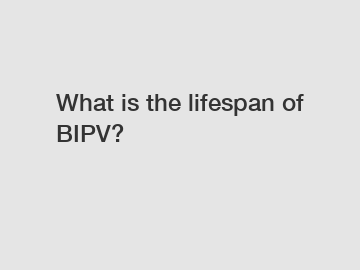What is the lifespan of BIPV?
How Long Does BIPVBIPV Last?
As the world continues to seek renewable energy solutions, building-integrated photovoltaics (BIPV) have gained considerable attention. BIPV refers to solar panels that are seamlessly integrated into building materials, such as roofs, walls, or windows, allowing structures to generate electricity while maintaining their functional purpose. While BIPV offers numerous benefits, one important consideration is the lifespan of these innovative solar systems. So, what is the lifespan of BIPV? Let's explore this question and unravel the factors that determine its durability.
1. The Concept of BIPV:

BIPV systems offer an aesthetically appealing and multifunctional approach to solar power generation. By integrating solar panels directly into building materials, BIPV eliminates the need for separate solar installations, resulting in a more streamlined and efficient energy solution. These systems provide multiple advantages, including enhanced building insulation, improved energy efficiency, and reduced carbon footprints. However, the lifespan of BIPV is a crucial aspect to evaluate when considering its long-term viability.
2. Longevity Factors:
Several factors affect the lifespan of BIPV, including the materials used, the manufacturing quality, and the level of maintenance. The type of photovoltaic (PV) technology employed also plays a significant role. Traditional silicon-based PV modules offer proven durability and typically come with warranties ranging from 20 to 25 years. However, recent advancements in thin-film PV technology have introduced alternative options that can be integrated into BIPV systems. These thin-film options, such as amorphous silicon and cadmium telluride, may have shorter lifespans compared to their silicon-based counterparts.
3. Material Selection:
The choice of materials utilized in BIPV greatly impacts its longevity. While solar panels are generally designed to withstand harsh weather conditions, the integration process and materials surrounding them must also be considered. High-quality protective coatings and robust seals are critical in ensuring the longevity of BIPV installations. Proper consideration and utilization of durable building materials will help extend the lifespan of the integrated solar panels.
4. Maintenance and Performance:
To maximize the lifespan of BIPV systems, regular maintenance is essential. This includes inspections to identify any signs of wear, damage, or deteriorating performance. Cleaning the solar panels periodically is also crucial to ensure optimal energy generation. In regions with heavy pollution or areas prone to dust storms, more frequent maintenance may be necessary to eliminate any potential obstructions. Furthermore, addressing any malfunctioning components promptly will ensure the longevity of the BIPV system as a whole.
5. Technological Advancements:
With the accelerating pace of technological advancements, the lifespan of BIPV is expected to improve. Ongoing research and development focus on increasing the efficiency, durability, and lifespan of PV modules. For instance, the integration of self-cleaning coatings or advanced encapsulation materials may mitigate the impact of environmental factors while requiring less maintenance. Such innovations will contribute to enhancing the overall longevity of BIPV systems and further solidify their position as a sustainable energy solution.
In conclusion, the lifespan of BIPV is influenced by factors such as the choice of materials, manufacturing quality, maintenance, and technological advancements. While traditional silicon-based PV modules typically offer warranties lasting 20 to 25 years, the emergence of thin-film options could impact the durability of BIPV. However, proper material selection, meticulous maintenance, and continual technological improvements are key to extending the lifespan of BIPV systems. As the world increasingly pursues renewable energy options, investing in BIPV holds great promise in achieving a sustainable future.
If you want to learn more, please visit our website pv roof tiles, solar pv roof tiles.
157
0
0


Comments
All Comments (0)